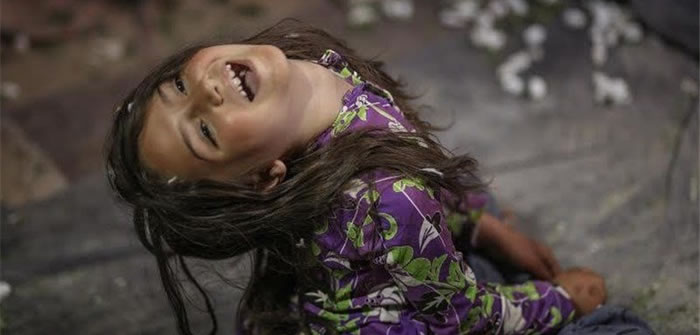The imaginative world of a 9-year-old girl is superbly captured in writer-director Narges Abyar’s meandering but fascinating Breath (Nafas), which takes its place among memorable Iranian films about childhood from masters like Kiarostami, Panahi, Naderi and Majidi. Here an insightful woman director’s POV is a welcome plus, along with an astonishing performance by first-timer Sareh Nour Mousavi in the emotion-packed main role of the motherless Bahar.
As Iran’s submission for consideration in the Academy Awards’ foreign-language film category, the pic comes with some impressive credentials, having won best director prizes at Tallinn Black Nights and the Vancouver Women’s Film Festival as well as best film laurels in the Fajr International Film Festival’s National Vision section. Though the subject is childhood, only adult audiences will be able to catch the heart-breaking gap between what Bahar knows and the cruelty of the world.
Abyar, a novelist and documentarist, has directed two previous features: Objects in Mirror Are Closer Than They Appear, the drama of a married couple; and Trench 143, which also revolved around the tragedy of the Iran-Iraq war. Her rising star should help Breath get some deserved notice. Making use of simply drawn animation and a realistic shooting and acting style, she conveys a feeling for life in 1977 to the early 1980s, the crucial years of the ousting of the Shah, the Islamic revolution and the devastating war with Iraq.
The story is narrated by Bahar herself in her slightly breathless, declamatory voice. We meet her lost in the wordless, hedonistic pleasure of a swing as it twirls her around, followed by the joyful excitement of a feather-strewn pillow fight with her sibs that salutes Jean Vigo’s rebellious Zero for Conduct. The tactile sensuality of these scenes draws the viewer into Bahar’s life.
Her dirt poor family lives in an unzoned area outside Tehran, where the kids walk to school over mountains in the rain and snow. Bahar and her brother and some cousins (the household varies in size depending on who is visiting) are raised by their fun-loving dad Ghafour (a delightful and unexpected Mehran Ahmadi), who puts food on the table thanks to his job as a truck driver.
For discipline there is Granny, a hawk-eyed old crone (Pantea Panahi Ha) who curses Bahar with a fervent “May God kill you!” at the slightest perceived misbehavior. She embodies society’s dim view of females and actively disparages book-reading as mentally unhealthy for girls. And yet at the same time Granny (who is not the kids’ biological relation, but their grandfather’s second wife) also represents a fortress of safety and tough love. Panahi Ha won the best actress prize at the Fajr fest for this incisive role.
The story is told episodically, without any strong narrative momentum, which can make it a wee bit tedious at times. Incidents are presented without emphasis or follow-up, like Bahar’s unrequited crush on her snooty classmate Iraj. We perceive that he resents being No. 2 in class to her No. 1, but she’s too young and innocent to realize this.
Bahar’s life is a mixture of hardship, fun and joy, emotions little Mousavi expresses with utter spontaneity and conviction. Her perpetually tangled hair is the symbol of a wild, untamed streak that makes her such a strong, endearing heroine and survivor. Her dad is an asthmatic joker who wears his own hair in a shaggy Beatles cut with the excuse that Samson’s long hair was his strength; later, he will cut it before going to war. He was rescued from the gutter by Babri Khan (veteran Jamshid Hashempour), the flamboyant local gypsy king, and they are still good friends, despite Granny’s disapproval. Rare in an Iranian film, the scenes of gypsy life are shown in a natural way, without folkloric or moralistic overtones (though Granny does wonder where all their money comes from).
Dad, like the other villagers, is sick of the Shah’s repressive regime, and they celebrate his deposition and the arrival of the Ayatollah Khomeini. When Saddam Hussein invades Iran, Ghafour enlists in the army and the family goes to stay with their relatives in Yazd, the central desert region. For the kids it’s a non-stop picnic, marred only by Bahar’s difficulty learning the Quran. Those great turning points in Iran’s history, revolution and the war, barely touch them, until falling bombs send them running to find shelter in neighbors’ basements. Lost in her own inner world, Bahar furtively draws pictures and reads lurid adult books like Human Traffickers of the 20th Century, which she illustrates in childish line drawings. Again, the point seems to be how innocence protects against the horrific harshness of real life. Only in the devastating final scenes does Abyar tear aside the veil.
Among the story’s pleasures is Saed Nikzat’s stirring modern photography that reinterprets the cusp of the 1970s and 1980s through the wondrous freedom of a child’s eyes. This special realism is all the more remarkable for the near-absence of religion, mosques and Islam in the screenplay, even as startling overhead shots offer God’s eye-view of buildings in the desert, a twirling swing, raindrops falling like tears on a fresh grave.
Production company: Noor Taban Film Company
Cast: Sareh Nour Mousavi, Mehran Ahmadi, Pantea Panahi Ha, Gelare Absi, Jamshid Hashempour, Shanam Moghadami, Siamak Safari, Gelareh Abbasi
Director-screenwriter: Narges Abyar
Producers: Mohammad-Hossein Ghassemi, Abouzar Pourmohammadi:
Director of photography: Saed Nikzat
Production designer: Asghar Nejad Imani
Editor: Sajad Pahlevanzadeh
Music: Massoud Sekhavatdoust
World sales: Iranian Independents
112 minutes
Written by Deborah Young for Hollywood Reporter

